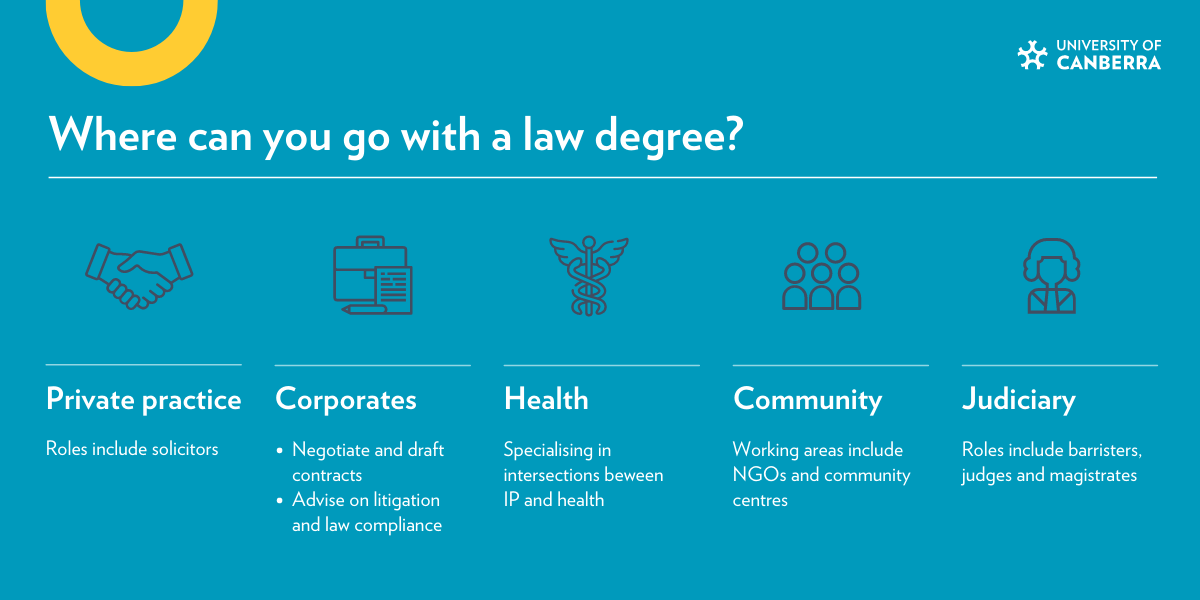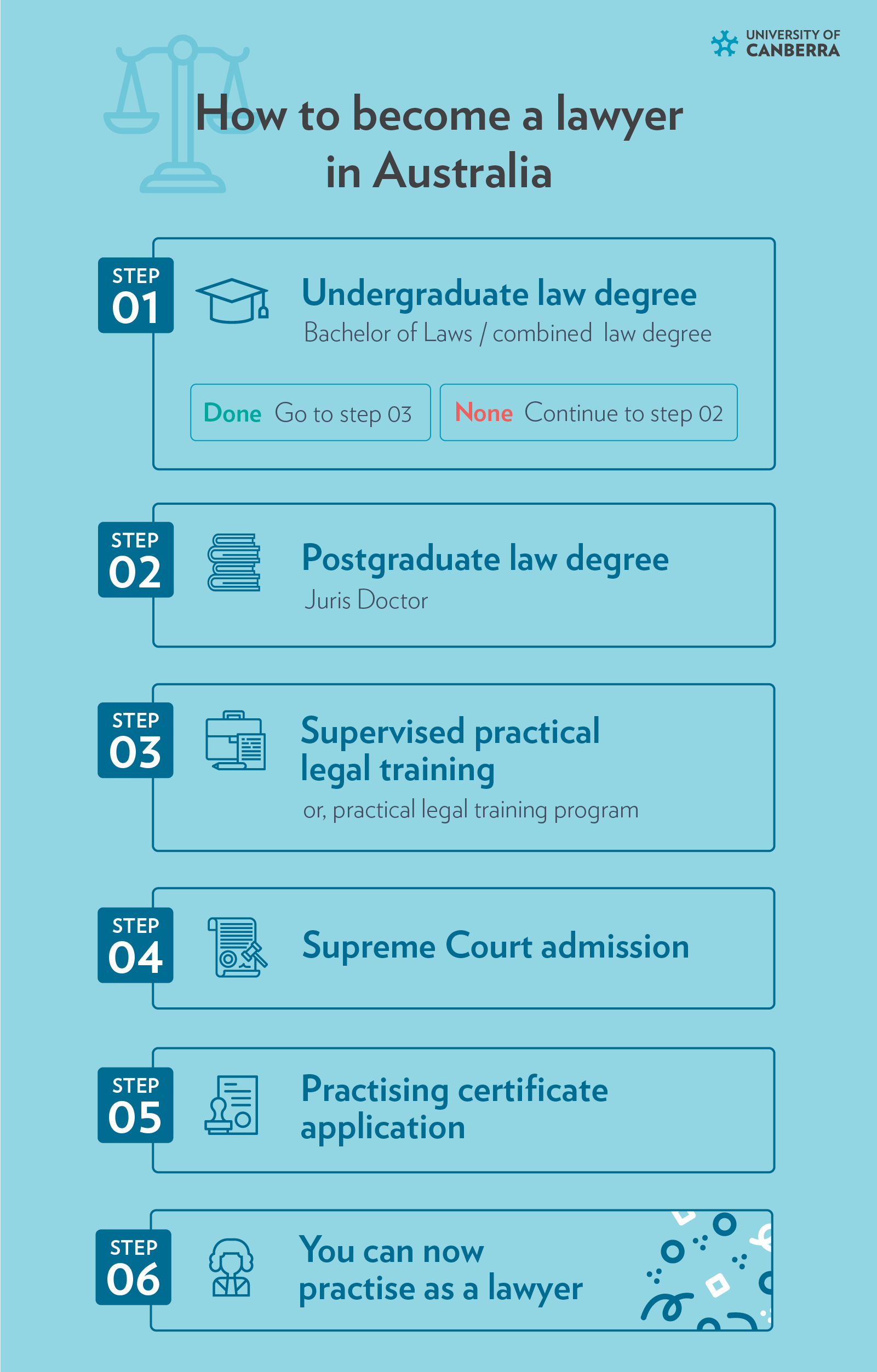How long does it take to become a lawyer in Australia?

TV shows about lawyers tend to focus on the more glamorous aspects of the profession. They make it seem like being a lawyer only involves wearing expensive suits, enjoying trendy restaurants, and making witty comebacks while delivering compelling court arguments.
While life as a lawyer can imitate art, a legal career offers many different rewarding experiences other than what you typically see on the small screen.
According to the University of Canberra’s (UC) Associate Professor and Juris Doctor Program Director, Dr Trevor Ryan, “Law, and especially criminal law, is overrepresented in the media. Maybe that’s why people are drawn to it. However, many of our Juris Doctor students are studying law because of their personal experiences. This may be a bit more realistic than some of the media depictions, which are often filmed in a different jurisdiction – usually the US or UK.”
Realistic doesn’t mean unexciting. In fact, lawyers are playing key roles working in complex areas of law, including:
- cryptocurrency and blockchain regulation
- international relations
- climate change
- security and terrorism.
What can you do with a law degree?
Dr Ryan adds that law offers many exciting opportunities for students – many of them in fields beyond the traditional TV-drama courtroom.
“Many graduates do go on to private practice as solicitors. However, others will negotiate and draft contracts in business, advise industry and government on litigation and complying with the law, or work as corporate lawyers. Others might go on to become barristers or work in the community for NGOs or community centres,” he says.
Beyond this, though, Dr Ryan explains that new, complex areas of law now offer students far more varied opportunities and choices beyond simply practising civil law.
Aside from the list above, he highlights intellectual property (IP) as an upcoming area of law that’s relevant to many different areas of our lives, especially the content we produce on social media. Another, he continues, is health – particularly the intersection between IP and health, and how the law governs both of these.

How long does it take to become a lawyer in Australia?
Typically, a Bachelor of Laws course takes four years to complete in Australia. After finishing Year 12 or completing an equivalent qualification, students can enrol in either a single degree course or a combined degree course.
The combined degree course takes around five years to complete.
How long will it take to become a lawyer without a Bachelor of Laws?
Those who have already completed a bachelor's degree in another discipline can opt to study a Juris Doctor online, which typically takes three years to complete.
Studying for a Juris Doctor qualification is a great choice if you want to advance your career, change industries or switch to a completely different career path.
And if you’re considering this path, the University of Canberra offers the option to either:
- fast-track your online degree to as little as three years
- study for it part-time as little as four years online.
This flexibility means you can complete your Juris Doctor degree wherever you’re based, fitting it around your work and family responsibilities.
Dr Ryan says that this can appeal to professionals who are looking for a career change. “In many careers, you may find yourself stuck in a rut after 10 or 15 years,” he says. “In our Juris Doctor, I teach many students in their 40s and 50s who come from different industries, and now want to do something more interesting. Some want to give back to their communities by helping people resolve their legal problems.”
In addition to completing an approved law degree, the path to admission as a lawyer also includes either:
- on-the-job practical legal training for three to five months, or
- completing a practical legal training program if your on-the-job experience was less than three months.
Once you’ve completed your practical legal training, you can apply to the Supreme Court in your state or territory for admission as a lawyer.

How long does it take to become a family lawyer in Australia?
Once you have been admitted as a lawyer, you don’t need any additional qualifications to become a family lawyer in Australia. Therefore, the time it takes to become a family lawyer is the same time it takes to become a lawyer in Australia.
Many firms specialise in family law and practise in teams where senior staff provide mentoring to junior staff members. This team set-up allows for new lawyers to gradually take on more challenging roles such as speaking in court.
Family law in Australia is regulated by the Commonwealth and largely follows the same set of rules throughout the country. As such, it is a very mobile area of law that uses many of the alternative dispute resolution methods taught in the University of Canberra’s online Juris Doctor.
How long does it take to become a patent lawyer in Australia?
After you have obtained a bachelor’s degree in a scientific or engineering discipline, it can take 3-4 years to become a registered patent attorney in Australia as you need to either:
- study for an accredited course that satisfies registration requirements
- work as a Technical Assistant (TA) for a patent attorney firm and pass examinations set by the Professional Standards Board for Patent and Trade Marks Attorneys
- be employed to look after patent matters for a company, or
- be an examiner of patents for at least one year.
Patent law can be very lucrative and there are also many opportunities in government, such as IP Australia.

How much does it cost to become a lawyer?
Many universities in Australia now publish cost estimates for a law degree, both for the first year and for the course in total. This transparency means you can choose which university suits you best and plan accordingly.
Check this 2020 comparison table to see how much it costs to get a Juris Doctor degree in Australia. The table shows Australian universities that offer the degree, along with their:
- cost per unit
- cost for the entire course
- tuition fees for the first year
- the time it takes to complete the degree.
The University of Canberra’s online Juris Doctor has 24 units in total. Each unit takes around seven weeks to complete, and – in 2022 – it costs $3750 (fees are revised annually so do check our Fees page for the latest information).
If you’re an Australian citizen or you hold an Australian permanent humanitarian visa, you might be eligible for the Commonwealth Government’s FEE-HELP loan scheme. This could help you pay for costs and materials associated with the degree.
The University of Canberra online Juris Doctor degree has six intakes each year, so you can start and finish your degree sooner and apply it to your work quicker. You can complete it part-time wherever you’re based, making it perfect for busy professionals who want to quickly take the next step in their careers. It’s also ideal if you need to fit studying around your family and work responsibilities.
How hard is it to be a lawyer?
Law is a complex field with its own set of challenges, moral dilemmas and ethics. The good news, Dr Ryan says, is that it also has strong frameworks to help lawyers navigate any dilemmas.
“Lawyers have to maintain a fine balance between their duty to the client and their primary duty to the court, no matter what kind of law they practise,” he says.
He cites an example where a lawyer might be asked to represent the former spouse of a current client. The profession has strict rules around these types of conflicts, so the lawyer has guidance to turn to, and they don't need to struggle through the dilemmas alone.
While being a lawyer often means long hours, it can be an incredibly rewarding profession. And not all law careers require gruelling hours, Dr Ryan says.
“There are options for everyone,” he says. “Perhaps you’re willing to put those hours into building your career and working your way up. If not, you might be more interested in ‘New Law’, where law firms have a flatter, more collaborative structure and more flexible working hours.”
Either way, he says, there’s always a trade-off between being a well-experienced lawyer earning big money and a career that sustains you financially and personally.
Law can also be a stepping stone into politics or advocating for justice. For example, both Barack and Michelle Obama were lawyers who were well known for their community service before they entered politics.
“Studying law is a flexible entry point to industries that have access to power,” Dr Ryan says. If you want the power to advocate for people, he recommends working in sectors like NGOs, community sector, government law and community legal services.
Additionally, he suggests that his students often think about going on to do pro bono work, which means providing free legal services to those in need. This can be a fulfilling way to use those hard-won legal skills for altruistic reasons.
“Pro bono work allows people to create change and contribute to the broader justice system,” he explains. “In my opinion, we need a certain percentage of our profession to step up and provide more pro bono services.”
Dr Ryan also notes that many firms are giving back in other ways, such as sponsoring causes or building relationships in the community. “Our universities often rely on the local legal fraternity to sponsor prizes for our students,” he finishes.
So, should you enrol in a Juris Doctor degree?
The short answer, according to Dr Ryan, is that it depends on your professional and personal goals.
“The law can enable you to do all sorts of things. You can represent people pro bono or in community legal centres. You can take on advocacy, guardianship and power of attorney roles,” he adds.
However, one thing is clear, a Juris Doctor degree is a path to doing far more than just practising law in a courtroom. Whether you want a complete career change, a qualification to advance in your current industry or a way to contribute to your community, a law qualification could help.
And if you want to take your first steps towards a new law career for the future, our Juris Doctor course could be the perfect entry point.



